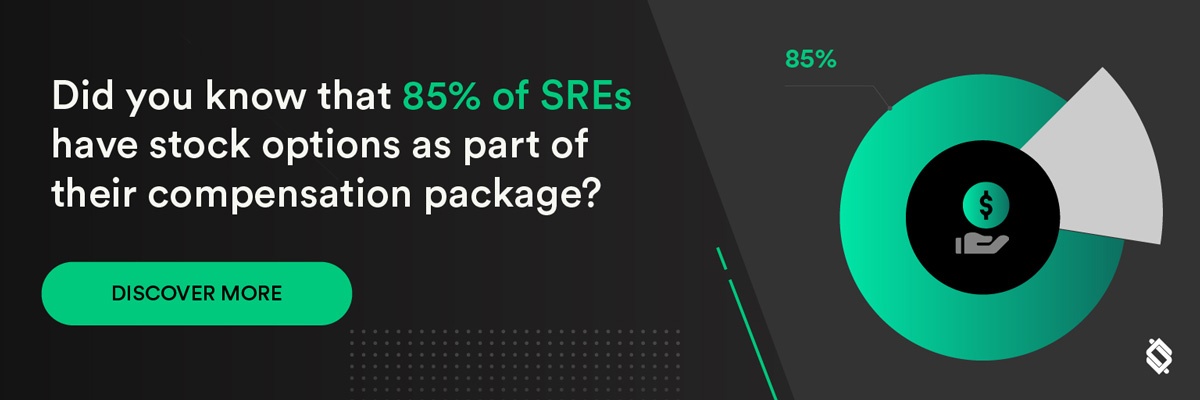In a market such as that for Site Reliability Engineers (SREs) jobs, where demand is high and supply is low, most candidates are passive. However, being passive doesn’t mean that top-tier SREs aren’t open to opportunities. Sometimes the grass really is greener, but should you stay where you are if you receive a counteroffer?
In our experience recruiting and placing SREs, we’ve certainly worked with several who have received counteroffers, and they often rely on us for advice. While we don’t want to make decisions for anyone, we do often relay key reasons why they should be wary of acceptance.
In this post, we’re sharing our expertise on the conundrum of the counteroffer.
What could a counteroffer contain?

In most cases, a counteroffer from your current company would include a salary increase. However, money isn’t the only motivator for job satisfaction. The counteroffer may include more benefits, stock options, or greater role responsibility. Depending on the content within the counteroffer, it can elicit different responses. So, let’s break down the issues with counteroffers.
Is it about money?
While there are many aspects of job satisfaction, salary is certainly one of them. If your sole dissatisfaction is the money you make, then a counteroffer may seem attractive.
In reality, employees leave companies more often for reasons that aren’t about the money. Those reasons include feeling unappreciated, having a poor relationship with management, not enjoying the corporate culture, and having a lack of flexibility. It’s rarely about the money, yet that’s all that changes with a counteroffer.
If your biggest issue is salary, then it may seem like a good deal. Most SREs, however, are already high earners. If your circumstance is only about compensation, you may still have trepidation accepting the counteroffer. You should do your due diligence and ask questions. Is the increase only to what would have already been your annual raise? Does it really reflect a significant gain in income?
Does the counteroffer include opportunity?
Money isn’t the only thing that can make a counteroffer appealing. Your reason for looking for a new role could be because you weren’t feeling professionally fulfilled. In some cases, a counteroffer could include a higher-level position or more responsibility.
That sounds great, but why didn’t they offer you this before? If your current company believed in your value and skills, why did it take the possibility of you resigning for them to make a move?
It’s likely you were drifting into disengagement. As an SRE, you’re highly intelligent, curious, and a problem solver. You love a challenge. So, when faced with a completely new opportunity or an adjusted role, which one will really fulfill you professionally?
Is there dysfunction in your current company?
There’s a reason you decided to seek out new horizons. The biggest reason people leave jobs isn’t the job. It’s their direct manager and an unhealthy culture. There are lots of statistics that confirm this position. A study found that 79 percent of people would seek new employment due to bad leadership. According to Gallup, managers account for 70 percent of the variance in employee engagement scores.
If you accept a counteroffer, your bad manager won’t reform, nor will the culture transform to be more inclusive and positive. Even if the counteroffer includes a new role with more control, you may still not be in a position to mandate change. Dysfunctional cultures, especially in the DevOps world, don’t change overnight, and they certainly won’t just because of a counteroffer.
If you stay, will they trust you?
Job hunting while still employed is often considered disloyal. However, employees are only as loyal as they are valued and appreciated. If you say yes to the counteroffer, new problems could emerge. Even though they are making an offer for you to stay, will they trust you? It could cause some bridges to burn, putting you in a bad position and unable to have autonomy or further responsibility.
Could it affect your career in the long term?
If you say yes to the counteroffer and are experiencing any of the aforementioned problems, it could impact your career in the long term. A study of senior executives and HR leaders found that 40 percent agreed that accepting a counteroffer is likely to harm someone’s career. The reason, according to the study, is that there is diminished trust and a compromised reputation. Additionally, your boss and colleagues may also resent you. Those interviewees in the study said that counteroffers only work out well 5 to 25 percent of the time. Further, the experts said that in these cases, it’s a short-term fix, with many employees leaving anyway.
All these things make it very hard to have a healthy DevOps culture, and you’re likely to be seeking opportunities again. In short, going with a counteroffer could derail your career path. While you may gain some benefits, the ramifications could be detrimental long-term.
How do you make the best career decisions?
Every person’s situation is unique, but in most cases, counteroffers aren’t usually the best choice for long-term job satisfaction and career growth. Ultimately, you have to make a decision that best aligns with your goals and aspirations.




